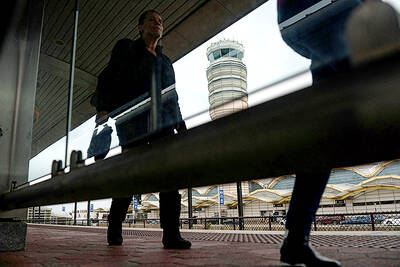Climate change will cause key species of fish to migrate toward the poles, badly depleting many commercial fisheries, scientists said in a study published on Thursday.
“The impact of climate change on marine biodiversity and fisheries is going to be huge,” said its lead author, William Cheung of the School of Environmental Sciences at the University of East Anglia in the UK.
Cheung’s team used a high-powered computer model, based on knowledge of 1,066 species of fish, their habitat and climate change, to predict what might happen by 2050 based on three scenarios for global warming.
Warmer water will lead to “large-scale redistribution” of these species, with most of them moving toward the poles, shifting on average by more than 40km per decade, they said in the report in the journal Fish and Fisheries that was to be presented at a meeting in Chicago yesterday.
Cheung said the report, written with scientists in the US and projecting average shifts of more than 200km over five decades, was the first to model climate impacts for more than 1,000 species such as herring, tuna, sharks or prawns.
Stocks of many species are already under pressure from over-fishing or pollution.
In the North Sea, a northward shift of cod could cut numbers by 20 percent. At the same time, North Sea stocks of the more southerly European plaice might rise by more than 10 percent.
And some cod populations off the east coast of the US might decline by half by 2050, the report said.
“Countries in the tropics will suffer most from reductions in catches,” Cheung said.
The UN Climate Panel says emissions of greenhouse gases, mainly from burning fossil fuels, are stoking climate change such as droughts or rising seas.
Overall, Cheung said total fish catches from the world’s oceans would be little changed by mid-century despite the shifts.
“It’s more about reshuffling the catch,” he said.
The study made computer models for the movements of 1,066 species — 836 types of fish and 230 invertebrates, such as crabs and lobsters.
Some species could die off, such as fish that thrive in cold waters and would have nowhere to go if the oceans warmed.
“Some species will face a high risk of extinction, including Striped Rock Cod in the Antarctic and St Paul Rock Lobster in the Southern Ocean,” the University of East Anglia said.
Cheung said shifts were under way. Trawlers off the western US, for instance, were having to travel further north to catch the same fish. That led to problems, for instance, of coping with currents or rocks in unfamiliar waters.

FRUSTRATIONS: One in seven youths in China and Indonesia are unemployed, and many in the region are stuck in low-productivity jobs, the World Bank said Young people across Asia are struggling to find good jobs, with many stuck in low-productivity work that the World Bank said could strain social stability as frustrations fuel a global wave of youth-led protests. The bank highlighted a persistent gap between younger and more experienced workers across several Asian economies in a regional economic update released yesterday, noting that one in seven young people in China and Indonesia are unemployed. The share of people now vulnerable to falling into poverty is now larger than the middle class in most countries, it said. “The employment rate is generally high, but the young struggle to

ENERGY SHIFT: A report by Ember suggests it is possible for the world to wean off polluting sources of power, such as coal and gas, even as demand for electricity surges Worldwide solar and wind power generation has outpaced electricity demand this year, and for the first time on record, renewable energies combined generated more power than coal, a new analysis said. Global solar generation grew by a record 31 percent in the first half of the year, while wind generation grew 7.7 percent, according to the report by the energy think tank Ember, which was released after midnight yesterday. Solar and wind generation combined grew by more than 400 terawatt hours, which was more than the increase in overall global demand during the same period, it said. The findings suggest it is

IN THE AIR: With no compromise on the budget in sight, more air traffic controllers are calling in sick, which has led to an estimated 13,000 flight delays, the FAA said Concerns over flight delays and missed paychecks due to the US government shutdown escalated on Wednesday, as senators rejected yet another bid to end the standoff. Democrats voted for a sixth time to block a Republican stopgap funding measure to reopen government departments, keeping much of the federal workforce home or working without pay. With the shutdown in its eighth day, lines at airports were expected to grow amid increased absenteeism among security and safety staff at some of the country’s busiest hubs. Air traffic controllers — seen as “essential” public servants — are kept at work during government shutdowns, but higher numbers

Elvis Nghobo tried to get into four different professional schools in Cameroon, but could not make it. Frustrated, the 34-year-old turned to selling food at a market in Yaounde, the country’s seat of power. Nghobo blames his woes on what he calls a corrupt education system that favors children of the elite. As the central African country prepares for Sunday’s presidential election, he said he would not be heading out to vote. He called the results a foregone conclusion for 92-year-old Paul Biya, the world’s oldest president, who has ruled for Nghobo’s entire life. “He is already too old to govern, and it’s boring